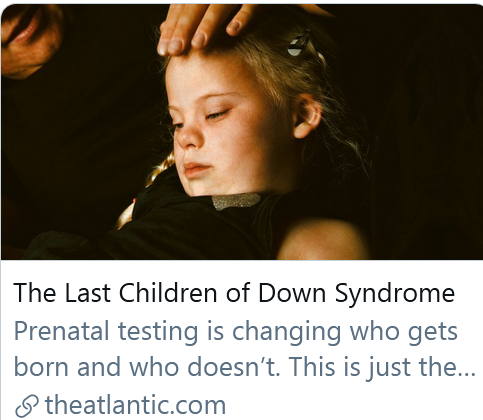The Last Children of Down Syndrome
Are we approaching a time when we will see the last children of Down Syndrome?
This shocking article, in the December 2020 issue of The Atlantic Magazine, looks at the possibility of Down Syndrome extinction. Medical advances (e.g. prenatal testing, new genetic therapies), are bringing this upsetting possibility closer.
What would a world without Down Syndrome look like? A stark potential future.
Here is a brief excerpt from the article:
“Denmark is not on its surface particularly hostile to disability. People with Down syndrome are entitled to health care, education, even money for the special shoes that fit their wider, more flexible feet.” And yet, “…a gulf seems to separate the publicly expressed attitudes and private decisions. Since universal screening was introduced, the number of children born with Down syndrome has fallen sharply. In 2019, only 18 were born in the entire country. (About 6,000 children with Down syndrome are born in the U.S. each year.)”
Furthermore, “The forces of scientific progress are now marching toward ever more testing to detect ever more genetic conditions. Recent advances in genetics provoke anxieties about a future where parents choose what kind of child to have, or not have. But that hypothetical future is already here. It’s been here for an entire generation.” This is represented in outcomes. “The decisions parents make after prenatal testing are private and individual ones. But when the decisions so overwhelmingly swing one way—to abort—it does seem to reflect something more: an entire society’s judgment about the lives of people with Down syndrome.”
Then comes the real controversy
“The medical field has also been grappling with its ability to offer this power. “If no one with Down syndrome had ever existed or ever would exist—is that a terrible thing? I don’t know,” says Laura Hercher, a genetic counselor and the director of student research at Sarah Lawrence College. If you take the health complications linked to Down syndrome, such as increased likelihood of early-onset Alzheimer’s, leukemia, and heart defects, she told me, “I don’t think anyone would argue that those are good things.”
But she went on. “If our world didn’t have people with special needs and these vulnerabilities,” she asked, “would we be missing a part of our humanity?”
hacklink
backlink sales
betpas
restbet
supertotobet
mersin escort
canlı bahis
gaziantep escort
Viagra 100 mg fiyat
Kamagra Jel fiyat
Cialis 20 mg fiyat
kalpli sigara
marlboro double fusion
captain black
escort
antalya escort
kocaeli escort
penis sertleştirici ilaçlar ve isimleri
penis sertleştirici hap çeşitleri
istanbul escort
izmir escort
bursa escort
istanbul escort
izmir escort
bursa escort
Ankara Escort
İzmir Escort
Antalya Escort
escort
istanbul escort
ankara escort
porn Child

Leave a Reply